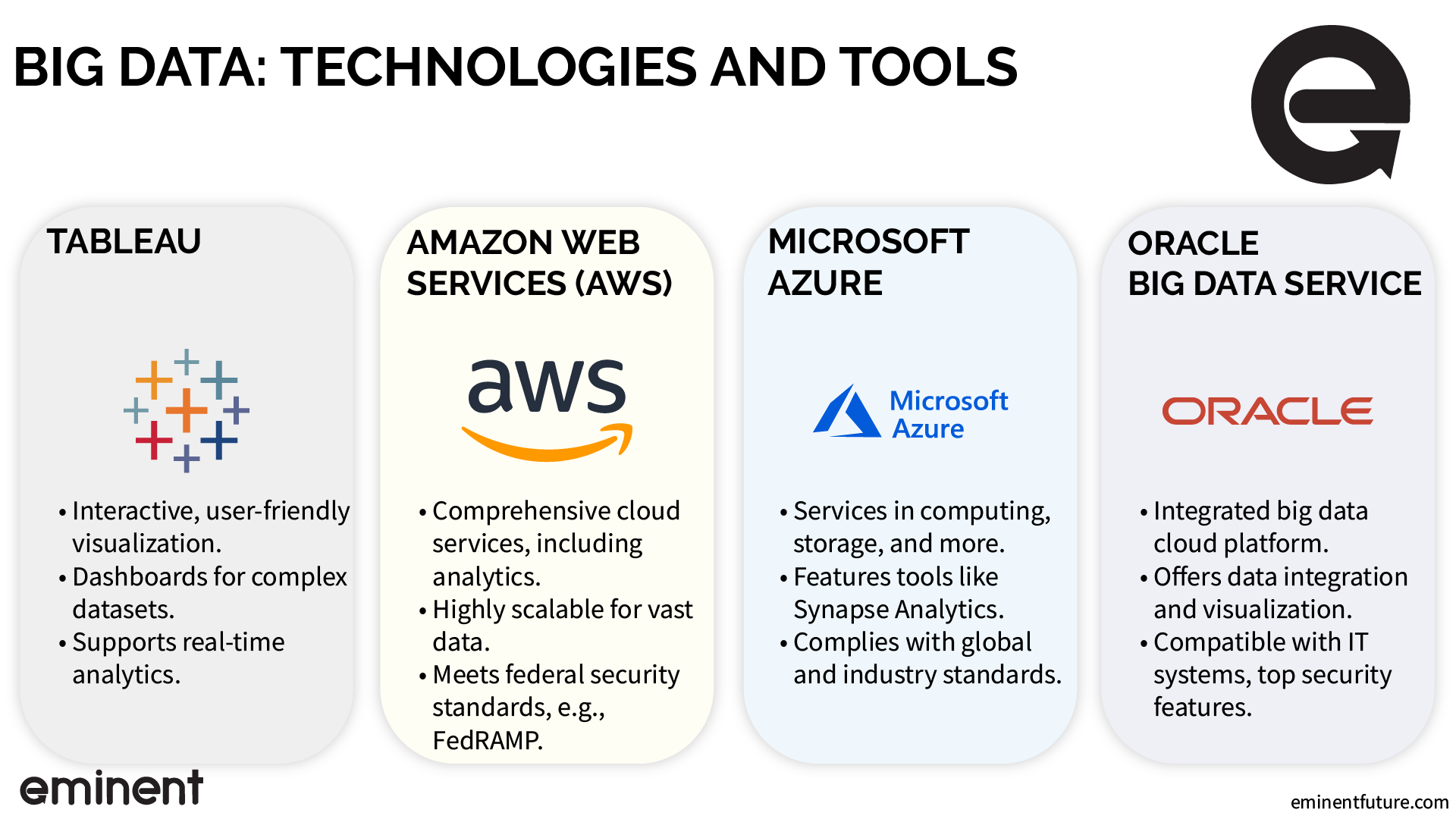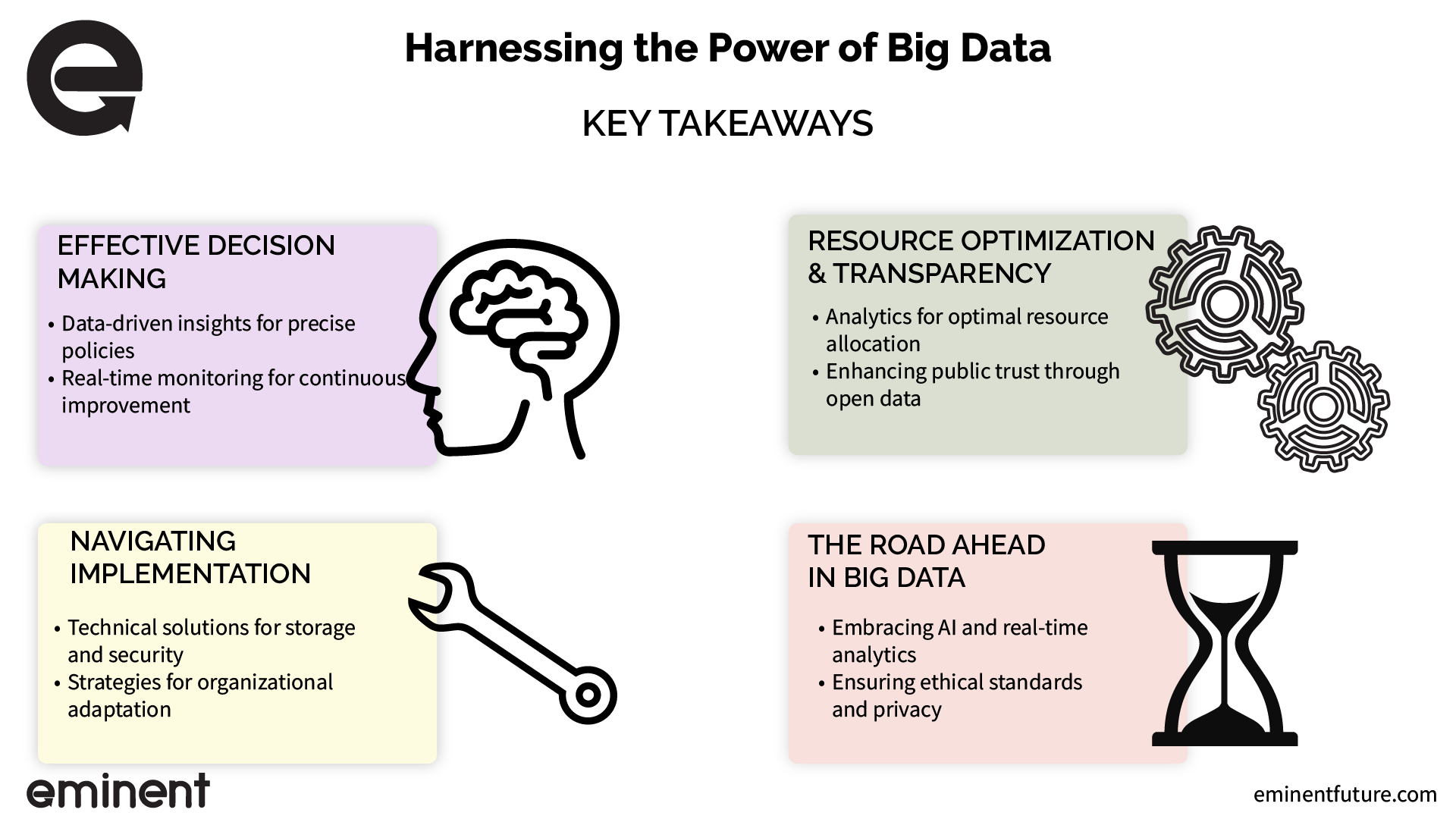In an age where information drives innovation and decision-making, integrating big data within the federal government’s processes is more critical than ever. Leveraging the sheer volume, variety, and velocity of data available today, big data analytics provide a means to analyze, interpret, and act on information in previously unimaginable ways.

This report delves into the importance of big data in federal decision-making, examining its role in policy creation, governance, predictive analytics, and more. By exploring case studies, practical applications, challenges, emerging trends, and prospects, we’ll uncover how big data revolutionizes the federal landscape, leading to more informed, effective, and efficient decisions.
Whether you’re a policy maker, technology enthusiast, or concerned citizen, this comprehensive insight offers a valuable perspective on a transformative force shaping our government’s approach in the 21st century.
Understanding the Importance of Big Data in Federal Decision Making
Big data is increasingly becoming essential in decision-making processes across various sectors, and the federal government is no exception. It offers unprecedented potential to transform federal directors’ decisions, leading to more informed, efficient, and impactful outcomes.

The Role of Data in Informing Policy Decisions
In an era where data is often called the “new oil,” its importance in shaping policy decisions cannot be overstated. Data provides the basis for informed decision-making, enabling policymakers to understand the real issues, identify patterns, assess the impact of policies, and make necessary adjustments.
Governments must often make complex decisions on various issues, from healthcare and education to national security and climate change. Each decision requires accurate information about the current situation, different options’ potential impacts, and previous policy implementations’ results. With the help of big data, we can quantify and analyze these factors, allowing for data-driven policy decisions.
How Big Data Can Contribute to More Effective and Efficient Governance
Big data takes traditional data usage a step further by handling enormous volumes of data from various sources and analyzing them to provide actionable insights. These insights can significantly contribute to more effective and efficient governance in multiple ways:
- Improved decision-making: Big data can provide comprehensive insights, enabling policymakers to make well-informed decisions.
- Efficiency: Through data analysis, governments can identify redundancies, streamline operations, and increase efficiency.
- Predictive capabilities: Big data allows for predictive analysis, helping the government to foresee potential issues and take preventive measures.
- Transparency and accountability: With data available for public viewing, big data promotes transparency and accountability in government operations.
Case Studies of Successful Big Data Usage in Federal Decision-Making
Big data is not futuristic but a tool currently being leveraged in federal decision-making. Let’s look at a few examples:
- Healthcare policy: The Centers for Medicare and Medicaid Services (CMS) uses big data to detect fraudulent claims, monitor patient health, and make policy decisions. By analyzing large amounts of data, CMS can identify patterns and trends that wouldn’t be evident with smaller data sets.
For more reading, check out this study: https://journalofbigdata.springeropen.com/articles/10.1186/s40537-018-0138-3
- National security: The Department of Homeland Security uses big data for various tasks, including analyzing social media to detect potential security threats, examining cargo manifests to identify illegal shipments, and predicting future threats to national security.
These cases illustrate the potential of big data to improve federal decision-making, providing more informed, effective, and efficient governance. As big data technologies advance, we anticipate increasing federal decision-making usage.
Implementing Big Data in Federal Agencies
With the ever-increasing volume, velocity, and variety of data, implementing big data analytics is becoming necessary for federal agencies. These agencies must transform their traditional data practices into a more comprehensive big data strategy. Implementing big data is a multi-faceted process, often involving significant changes to data collection, storage, management, analysis, and interpretation.

Steps for Integrating Big Data Analytics into Federal Agency Operations
Steps for Integrating Big Data Analytics into Federal Agency Operations
- Data Collection: The first step towards implementing big data analytics in federal agencies is data collection. This involves gathering data from various sources, including but not limited to administrative records, sensor data, social media feeds, and public records. Federal agencies should collect high-quality and relevant data that aligns with their objectives.
- Data Storage and Management: With the mass amount of data collected, federal agencies need robust data storage and management systems. They must consider data storage solutions that can handle large data volumes, provide easy accessibility and ensure data security. Solutions could include on-premises data centers, cloud-based platforms, or a hybrid approach.
- Data Analysis and Interpretation: Once the data is collected and stored, it must be analyzed and interpreted to draw actionable insights. Federal agencies should leverage advanced data analytics techniques, including machine learning and artificial intelligence, to analyze large datasets. The aim is to discover patterns, trends, and insights that can inform decision-making.
Technologies and Tools for Big Data Analytics
Several technologies and tools can help federal agencies to implement big data analytics. Here are some commonly used ones:
- Microsoft Azure: This is a cloud computing platform by Microsoft, offering a range of cloud services, including data storage, data analytics, and machine learning tools. Azure provides the flexibility and scalability required for big data analytics, allowing for seamless processing and analysis of large datasets.
- Tableau: Acquired by Salesforce, Tableau is a robust data visualization tool that can connect to almost any data source, including those in Microsoft Azure and AWS. It is widely used in government agencies for its ability to provide interactive, real-time visualization and analytics and its capacity to handle millions of rows of data efficiently.
- Amazon Web Services (AWS): Amazon’s cloud platform provides a wide range of tools and services for big data analytics. It offers storage, computing power, and big data-specific services like Amazon Redshift for data warehousing and Amazon Kinesis for real-time data processing.
- Oracle Cloud: Oracle offers an integrated and comprehensive platform for managing, processing, and analyzing large volumes of data. It has various big data solutions, including Oracle Big Data Service, a Hadoop-based data lake that stores and analyzes large amounts of raw data, and Oracle Cloud SQL for easy data querying.
- IBM Watson: IBM Watson is a suite of AI services, applications, and tools that analyze and interpret complex data, including unstructured text, images, audio, and video. Watson can help government agencies analyze data more contextually, discovering insights that traditional analysis methods may miss.
By implementing big data analytics, federal agencies can uncover valuable insights, make data-driven decisions, and improve operational efficiency.
Addressing Data Security and Privacy Concerns
- Implementing Security Protocols: Ensuring the integrity and confidentiality of data is paramount. This involves implementing robust security protocols and encryption.
- Compliance with Privacy Regulations: Federal agencies must comply with various laws and regulations related to data privacy, including the Privacy Act of 1974 and GDPR for international data.
- Regular Security Audits and Assessments: Regular assessments and audits of data security practices help ensure ongoing compliance and uncover potential vulnerabilities.
Practical Applications of Big Data in Federal Decision Making
Big data has revolutionized how federal agencies make decisions, providing actionable insights and contributing to more informed and effective governance. Here are some key areas where big data plays a vital role in federal decision-making:

Policy-making: Using Big Data to Inform and Develop Effective Policies
- Data-Driven Insights: By analyzing vast amounts of data, agencies can uncover patterns and trends that inform policy creation. This data-driven approach enables more precise targeting of issues and the development of tailored solutions.
- Real-time Monitoring and Adjustment: Big data allows for real-time monitoring of policy impact, facilitating swift adjustments as necessary to maximize effectiveness.
Resource Allocation: Using Big Data to Optimize the Distribution of Resources
- Identifying Needs and Priorities: Through analytics, agencies can identify where resources are needed most, ensuring that funds, personnel, and other assets are allocated effectively.
- Enhanced Efficiency: Big data tools can help optimize resource distribution, reduce waste, and ensure that each dollar is used where it can have the most impact.
Predictive Analytics: Using Big Data to Predict Trends and Make Proactive Decisions
- Forecasting Future Trends: Predictive analytics utilize historical data and machine learning algorithms to predict future events or trends, allowing agencies to take proactive measures.
- Risk Mitigation: Predictive models enable agencies to identify potential risks early on, allowing for the development of strategies to mitigate them before they become significant problems.
Performance Measurement: Using Big Data to Track and Improve Agency Performance
- Setting and Monitoring Performance Metrics: Big data enables the establishment of clear and measurable performance metrics. Agencies can continuously track these metrics to assess performance.
- Continuous Improvement: Insights gleaned from performance data allow agencies to identify areas for improvement, enhancing efficiency, effectiveness, and overall performance. `
Challenges in Big Data Implementation and Strategies to Overcome Them
Implementing big data in federal agencies presents a host of unique challenges across technical, organizational, and legal domains. Navigating these complex issues requires a thoughtful approach, combining innovative solutions with an understanding the inherent risks and ethical considerations.

Technical Challenges: Data Storage, Analysis, and Security Issues
Implementing big data in federal agencies requires substantial technological infrastructure and expertise. The sheer volume of data demands robust storage solutions, while the complexity of the data necessitates advanced analytical tools.
Security is another paramount concern, as sensitive information must be protected against unauthorized access and cyber threats. Investing in modern hardware, employing skilled data scientists, and implementing comprehensive security protocols are essential to overcome these technical challenges.
Organizational Challenges: Resistance to Change, Lack of Skills, and Cultural Barriers
The adoption of big data analytics can encounter resistance within an organization. Some employees may be wary of change or need more skills to use new technologies. Cultural barriers may also hinder the embrace of a data-driven approach.
To tackle these challenges, agencies must foster a culture that values innovation and continuous learning. Training programs, workshops, and leadership support can facilitate the transition, empowering employees to work effectively with big data tools.
Legal and Ethical Challenges: Data Privacy, Data Ownership, and Data Bias Issues
Big data in federal agencies must be handled with careful consideration of legal and ethical considerations. Data privacy requires adherence to regulations and best practices for handling personal or confidential information. Data ownership rights must also be respected, including intellectual property considerations and agreements with third parties. Data bias can inadvertently influence analysis, leading to unfair or unethical outcomes. Ethical guidelines, legal compliance, and ongoing vigilance are crucial in managing these complex issues.
Strategies to Overcome These Challenges
Successfully implementing big data in federal decision-making demands a multi-faceted approach to the abovementioned challenges. Collaboration with technology providers, investment in staff development, and interdisciplinary team creation can foster a supportive environment for significant data initiatives. Emphasizing transparency, ethical principles, and legal compliance should be foundational to any big data strategy. Regular audits, reviews, and updates ensure the systems remain effective and aligned with the agency’s goals and the broader public interest.
Future of Big Data in Federal Decision-Making
The landscape of big data is ever-evolving, and with the rapid pace of technological advancements, it is poised to play an even more critical role in federal decision-making. As the government continues to embrace data-driven methodologies, it must also stay ahead of the latest trends in big data analytics and understand their potential impact.
Emerging Trends in Big Data Analytics
- Machine Learning and AI Integration: Integrating machine learning and AI into big data analytics can facilitate more in-depth insights, enabling more accurate predictions and automating complex tasks.
- Real-Time Analytics: The need for instantaneous information drives the shift toward real-time analytics. This approach always allows decision-makers access to the latest data, enhancing responsiveness.
- Edge Computing: Processing data closer to the source of collection (e.g., IoT devices) reduces latency and enables more efficient use of resources. This trend will likely continue growing, especially in areas requiring immediate data analysis.
- Data Privacy and Security Enhancements: As concerns over data privacy grow, new technologies are emerging to ensure that data is handled with the utmost security and compliance with regulations.
The Potential Impact of These Trends on Federal Decision-Making
The trends in big data analytics are set to impact how federal agencies operate significantly:
- Enhanced Decision Accuracy: With more advanced tools and methodologies, decisions can be made with greater precision, reducing errors and leading to more effective policy implementation.
- Increased Agility: Real-time analytics and edge computing enable quicker response to emerging situations, whether they are changes in economic conditions, natural disasters, or other urgent scenarios.
- Improved Transparency and Accountability: Modern big data solutions offer more transparent processes, allowing for more robust oversight and increasing public trust in government actions.
- Strategic Alignment with Ethical Standards: The emphasis on data privacy and ethical handling ensures that federal agencies remain aligned with societal values and legal obligations, further enhancing their legitimacy and efficacy.
The future of big data in federal decision-making is a dynamic and promising field, filled with opportunities to enhance efficiency, accuracy, and integrity. Adopting emerging trends will require careful planning, foresight, and a commitment to innovation, all vital for data-driven governance’s continued success and evolution.
Embracing the Future of Data-Driven Governance

Big data transforms federal decision-making, improving efficiency, accuracy, and transparency. However, its integration comes with technical obstacles and ethical concerns. With emerging trends like machine learning and real-time analytics reshaping the field, the opportunities for enhancement in governance are vast.
In conclusion, implementing big data is not just an option but a necessity for modern governance. Federal agencies can unlock big data’s full potential with careful planning and a commitment to innovation. The age of data-driven decision-making is here, marking a significant evolution in how government operates and serves the public.



